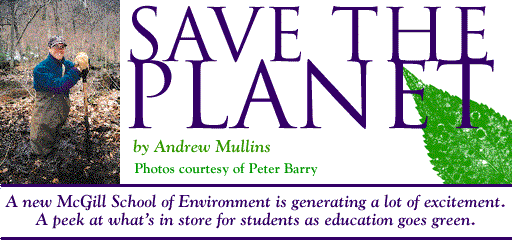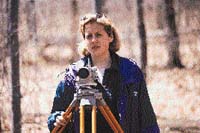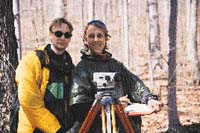
"People look at their garbage differently now, seeing every bottle and crushed carton in a planetary context," writes Don DeLillo in his recent novel, Underworld. Environ-mental concerns are no longer the sole domain of "radical" environmentalists, green parties on the political fringe, activist organizations like Green-peace, or for that matter, the scientific researchers who labour away in obscurity. Indeed, the environment has very much taken its place on the world political stage, as evidenced, for example, by last December's international agreement on global warming in Japan, or by the ongoing and very public woes Canada (among other countries) is having with the fisheries and forestry industries. Phrases and concepts like "renewable resources," "waste management" and "sustainability" have become common parlance, usually carrying undertones of urgency and even planetary distress.
But while many of their parents are still adjusting to rinsing out cans and jars, and bundling newspapers for the recycling pick-up, students arriving at universities these days are well-schooled in the basics of the environment and the state of the planet -- and its ongoing devastation by its human population. As more and more of these environment-conscious young people embark upon post-secondary education, they are looking for environmental programs that meet their goals and concerns, and universities are beginning to adapt.
 This September will see the launch of the McGill School of Environment (MSE). A few years ago, a group of professors began discussing the integration of McGill's offerings in environmental studies. Courses in environmental science had long been available at McGill, but they were scattered across departments and faculties with no unifying program or degree. According to Nigel Roulet, Director of the Centre for Climate and Global Change Research, who also headed the executive committee preparing the launch of the MSE, "Even though the strength in environmental studies was there at McGill, it wasn't recognized by other universities and students." This September will see the launch of the McGill School of Environment (MSE). A few years ago, a group of professors began discussing the integration of McGill's offerings in environmental studies. Courses in environmental science had long been available at McGill, but they were scattered across departments and faculties with no unifying program or degree. According to Nigel Roulet, Director of the Centre for Climate and Global Change Research, who also headed the executive committee preparing the launch of the MSE, "Even though the strength in environmental studies was there at McGill, it wasn't recognized by other universities and students."
The MSE should change that perception. The result of an unusual alliance between the faculties of Arts, Science, and Agricultural and Environmental Sciences, the program has been designed with an innovative and multidisciplinary bent.
"Synthesis is critical in understanding environmental issues," says Roulet. "The environment is by its very nature a transdisciplinary subject: there are social, cultural, economic and scientific aspects to every environmental issue."
That is why the school's creators have taken the multidisciplinary path. Professors from three faculties will be teaching students under one environmental banner, and courses are designed specifically for the school itself. The multidisciplinary approach, however, is more than a range of disciplines making up the curriculum: students in science courses will also be examining the cultural concerns of their subject -- for instance, environmental ethics -- and students in arts and social science courses will look at the science behind their studies. Guest lecturers from different disciplines will be a common part of the program. And there will be more to come, as other faculties like law and engineering, with important environmental offerings of their own, are expected to join the MSE down the road.
 A cooperative effort like the MSE, which will include up to 100 faculty members with varying levels of involvement, is an important step in McGill's future, says Dean of Arts Carman Miller. "Initially there was understandable apprehension," Miller says, "but we brought in a facilitator and workshopped the idea, and came out with a plan of what we wanted. It was a good example of inter-faculty cooperation, and all of us now know something we didn't know about the other faculties." Miller believes the result can serve as a model for the University. "McGill has immense resources, and if we can tap them we can have richer programs, rather than competing programs." A cooperative effort like the MSE, which will include up to 100 faculty members with varying levels of involvement, is an important step in McGill's future, says Dean of Arts Carman Miller. "Initially there was understandable apprehension," Miller says, "but we brought in a facilitator and workshopped the idea, and came out with a plan of what we wanted. It was a good example of inter-faculty cooperation, and all of us now know something we didn't know about the other faculties." Miller believes the result can serve as a model for the University. "McGill has immense resources, and if we can tap them we can have richer programs, rather than competing programs."
Of like mind is Dean of Agricultural and Environmental Sciences Deborah Buszard, out at McGill's "green campus" -- the Macdonald campus in Ste. Anne de Bellevue. "It's not often you get to do something radical and new in the University, so this is very exciting." And, she stresses, the inter-faculty, multidisciplin-ary program is "the only way to look at environmental issues."
The backbone of the MSE program will comprise four core courses, which all MSE students will take in their first year. These core courses are designed to introduce students to the central concepts of environmental issues. They will include: the Global Environment, where students will examine environmental issues at the global scale, such as global warming and the greenhouse effect; Society and the Environ-ment, a look at the cultural and economic aspects of the environment; the Evolving Earth, the study of the physical and biological diversity of the planet; and Know-ledge, Ethics and the Environment, which will examine how different and often conflicting cultures, ethical and legal systems, and world views affect the environment.
"We want to give the program breadth without sacrificing depth," says Professor Jim Fyles of the Department of Natural Resource Sciences at Macdonald Campus and the interim director of MSE. "That's why we have the core courses, plus the domains."
"Domains" are another MSE innovation. After students complete the four core courses they will pick an area of environmen-tal specialization -- a domain. Nigel Roulet points out that the domains fall more "around a particular subject area or en-vironmental problem than any one discipline." So students might focus on areas such as environment and development, land resource management, or biodiversity and conservation, as op-posed to one discipline like anthropology or biology.
The MSE program will also have a fieldwork component, and depending on their specialization, MSE students will be using field stations at Mont St. Hilaire, the Morgan Arboretum on the Macdonald Campus, the McGill Subarctic Research Station in Schefferville, Que., the Bellairs Research Institute in Barbados and the McGill High Arctic Research Station on Axel Heiberg Island, Nunavut. In addition, McGill has linked up with the Smithsonian Tropical Research Institute in Panama, where some students will be able to study for a semester (though to do so, they will have to contend with culture shock, higher tuition, and very big spiders, says Jim Fyles). Plans are under way for a similar MSE field program in Kenya, and as the MSE matures, more locations will be added around the globe.
 Students will graduate with either a BA or a BSc, and the School is also offering a minor and a diploma. Though no graduate program will be offered initially (there is talk of one for the future, says Fyles), students will be poised to move on to graduate studies in areas like biology and natural resources, environmental management, or in humanities programs focusing on development issues. "It depends on the individual student and individual program," Fyles points out. "For instance, the health and environment domain might lead someone into ecotoxicology." Students will graduate with either a BA or a BSc, and the School is also offering a minor and a diploma. Though no graduate program will be offered initially (there is talk of one for the future, says Fyles), students will be poised to move on to graduate studies in areas like biology and natural resources, environmental management, or in humanities programs focusing on development issues. "It depends on the individual student and individual program," Fyles points out. "For instance, the health and environment domain might lead someone into ecotoxicology."
As for what the job market will look like for MSE grads, Fyles says that, traditionally, governments have been the largest employer of environmental experts, in areas like pollution control, Parks Canada, provincial ministries and environmental consultants. "But the job market is changing fast," he says, and entirely new job categories are being created. Citing the example of a new species of auditors -- environmental analysts in-stead of the more familiar number crunchers -- Fyles says, "Companies are now looking to receive certification that their operations are environmentally sound. This is a job that never existed until five years ago." Likewise, disasters such as the Exxon Valdez oil spill in Alaska in 1989 got the attention of insurance companies. "They're now looking at environmental risks the way they look at other risks," Fyles says, and those companies need to hire people with the expertise to conduct environmental assessments.
With such new job opportunities and an already high level of environmental concern among the student body, the MSE will likely prove very popular. "We're dealing with the first generation of students who no longer think of the environment as distant," says Roulet, "but who -- because of schooling, television and various things -- are a much more environmentally enlightened group. We're expecting to be oversubscribed."
Fyles agrees. "There's remarkable interest from students within McGill, but word has got out as well, and we're hearing from a lot of students outside the University. And we haven't even started recruiting yet."
|